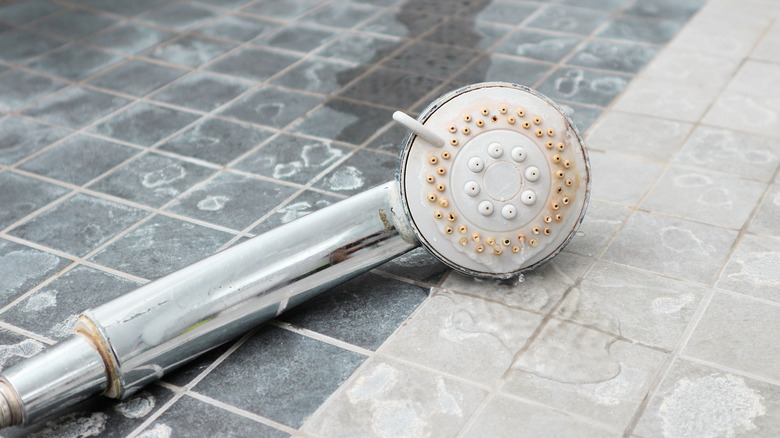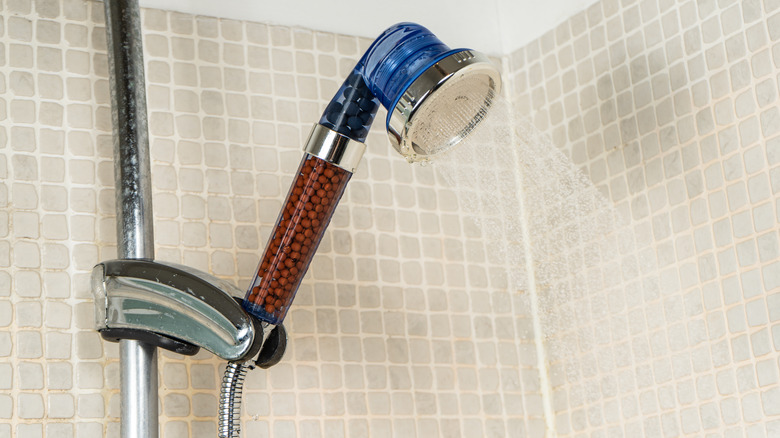Here's What You Need To Know About Shower Head Filters Before Buying
Since 1974, the quality of the water in our pipes has been regulated thanks to The Safe Drinking Water Act. However, studies have shown that there is still a significant amount of contaminants in our water supply. A 2023 report from the U.S. Geological Survey shows that at least 45% of the nation's tap water contains one or more PFAS chemicals. While the extent of the harm these long-lasting chemicals cause is still being studied, they are thought to have adverse effects on human and environmental health. Luckily, many effective products have been created to further purify the water we come in contact with daily.
Most people have a filter for their drinking water, but have you considered filtering the water you shower with? While we don't ingest this water, it frequently comes in contact with our skin and hair. Unfiltered water can be harmful to your health, but it can also have effects on your appearance. Some of the chemicals present in tap water cause dry, irritated skin and significantly damage your hair. Adding in a shower head filter can eliminate these issues and help you create a cleaner, healthier home, but there are a few considerations you need to think about before you hit checkout. Here is what you need to know about shower head filters before you buy.
Do shower head filters actually work?
The short answer is: yes, shower head filters actually work, but they only effectively filter out certain elements. Very rarely will one product be a total solution, especially for a problem as large as a contaminated water supply. Each shower filter has different abilities, but generally, they will be highly effective at removing chlorine and chloramines. Chlorine, that strong-smelling chemical put in swimming pools, is also added to tap water to disinfect it. While this kills disease-causing germs, it creates other problems for your health and cleaning routine.
Shower head filters will thoroughly decrease the amount of chlorine present in your shower water. Some also remove heavy metals, sediments, rust particles, bacteria, and algae. If you have a limescale issue, a shower head filter with KDF will reduce the build-up causing bacteria. You want to choose a filter based on the quality of water where you live and what contaminants are present. All shower filters will increase the purity of your water, but to address specific concerns and get the most out of your product, spend some time deciding what filter is right for you. One thing a shower head filter doesn't do is soften the water. While this might not be a problem for everyone, if you find yourself with hard water stains, it might be a sign that your home could benefit from a water softener in addition to a shower head filter.
What to consider when choosing a shower head filter
The first thing you'll want to decide when picking a shower head filter is what type of filtration you need. All reputable options will reduce the amount of chlorine and certain other synthetic chemicals, but some come with added benefits for filtering out minerals that can cause hard water. Research your local water quality report to see what contaminants are in your supply, and pick a filter that addresses those specific concerns. This will help maximize the benefits of whatever product you buy. And you'll want to get the most out of it because shower head filters aren't always cheap. Some options are as affordable as $20, but the more specialized and powerful the filters get, the prices can go well over $100. Some have the option of a removable and replaceable filter component, which might cost more upfront but save you money down the line.
Different types of filters require different levels of DIY installation skills, too. Some filters just look like a regular shower head and can be easily swapped out with your existing one. Other filters are installed on the shower arm itself, screwed in between the water supply line and your shower head. In-line shower filters are installed in-line with the water supply pipe, usually behind the wall, and might require you to hire a plumber. Thankfully, numerous options exist in different styles and finishes, making it easy to find one that suits your bathroom.


